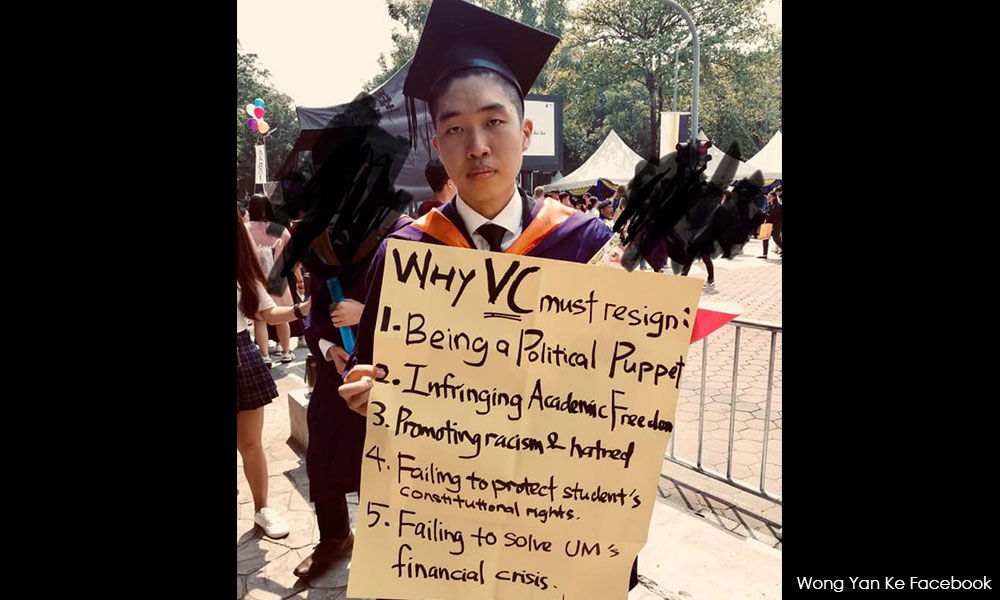MALAYSIANSKINI | For many, a graduation ceremony of the nation's top university is a memorable moment in one's life - a personal milestone to be celebrated.
But in the case of Wong Yan Ke (photo), the decision to use the platform for a brief protest has meant that his graduation has instantly put him in the national spotlight.
His call for Universiti Malaya (UM) vice-chancellor (VC) Abdul Rahim Hashim to step down has seen fellow Malaysians praise and curse him, criticise and defend his actions.
In the midst of the storm, Malaysiakini decided to meet Wong in person, and get to know more about why he did what he did.
This was the day after he gave his statement to the police. Clad in a T-shirt and jeans, Wong looked no different from other students. However, when we walked around the UM campus, people were looking at him.
“I felt that those people were staring at me,” he giggled.
2019 is a year in which not one, but three major incidents brought him to media attention, and a trip to the police station seems to crop up every three months.
In March, Wong was manhandled by former prime minister Najib Abdul Razak’s supporters over his ‘clown-faced Najib mask’.
In June, Wong claimed police intimidation after attending Hong Kong’s anti-extradition to China movement event at Kuala Lumpur.
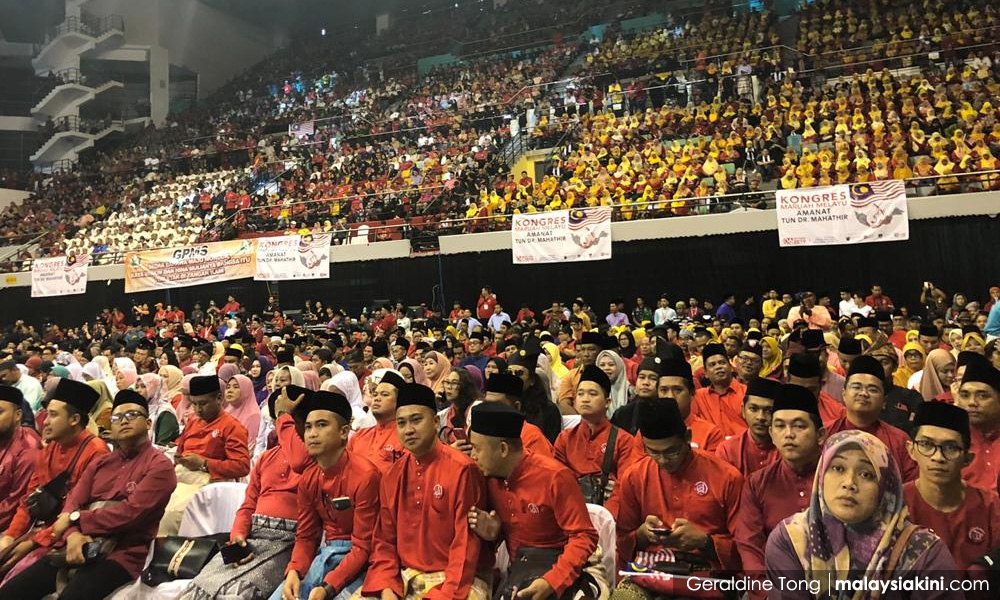
And of course, this month he completed his hat-trick with the UM stage protest during which he held up a yellow sign during his convocation that stated ‘Tolak Rasis’ and ‘Undur VC’ (Reject racism and VC step down) and shouted "Ini Tanah Malaysia" in response to the VC's participation in the racially-charged Malay Dignity Congress (above).
But he vows not to shy away from the spotlight.
“I was simply defending the universal values that I believe in, which is justice and freedom,” he said.
A talkative boy
The 23-year-old admitted that he has been a chatterbox since his childhood and that made him a very self-assertive person, with his own opinions on almost every issue.
In 2008, a question raised from his tuition class teacher piqued his interest about politics in Malaysia.
“That time was right after the 12th General Election. The teacher asked whether our parents voted for dacing (Barisan Nasional) or rocket (DAP). Most of my classmates answered ‘rocket’ with cheers.
“I was shocked, to be honest. I never knew that my classmates would know who their parents voted for. From that moment, I started to read political news in the newspaper,” said Wong, who was 12 at the time.
From law to engineering
Since then, the young boy started to channel his passion for political and social issues, which inspired him to want to become a lawyer.
However, he did not make it.
“My parents worried that my personality would eventually drag me into the ‘dirty’ world of politics and expose me to a lot of uncertainties when it comes to personal safety.
“After taking my parents’ advice into consideration, I finally chose a civil engineering course for my studies in UM,” Wong said.
Exposure to the bullying culture
During his four years in UM, Wong claims to have witnessed and encountered a lot of irrational treatment from the varsity administration and hostel seniors.
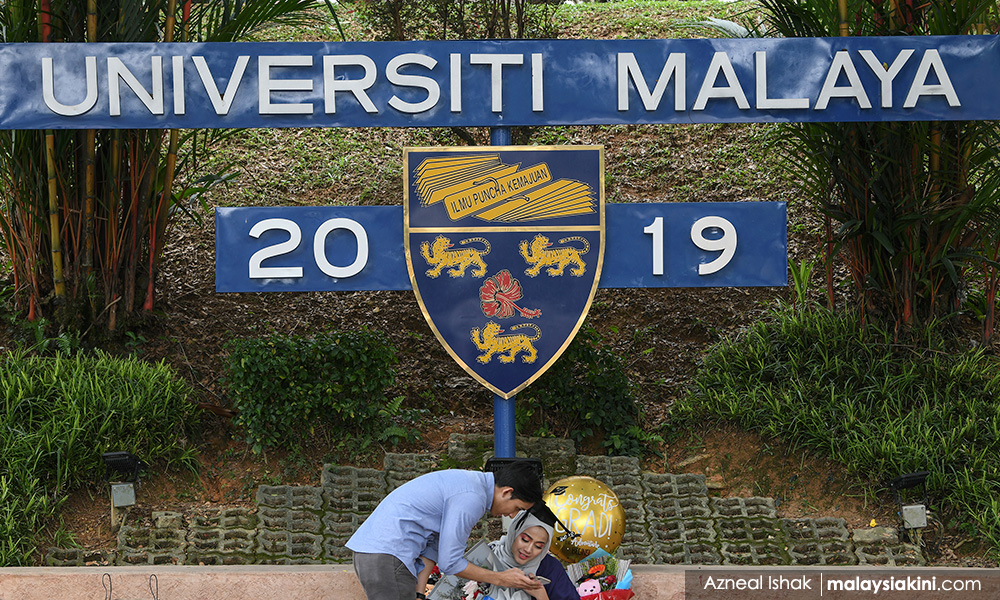
Recalling the first week in the university, the “bullying culture” of orientation week made him felt extremely “uncomfortable”.
According to Wong, freshies have to stay up late every night and get scolded or punished for no reason by the seniors. The culture is seen as a norm and a way for seniors to “educate” the freshies.
“Even though it is a culture, we also need to question its rationality and legitimacy and not follow it blindly,” he stressed.
Active involvement in student activism
During his four years in university, Wong actively participated in the Chinese Language Society of Universiti Malaya and became its chairperson for two years.
Initially, Wong wanted to launch a series of activities to increase the general knowledge of students about social issues.
That was when he encountered bureaucratic obstacles within the university administration and a culture of fear on the campus.
On one occasion, he represented the society in endorsing a demand for then-premier Najib Abdul Razak to step down but his committee asked him to retract his statement due to the fear of disciplinary action by the university.
Although there was some resistance, he was unwilling to give up and decided to organise a series of talks themed “Rule of Law”.
However, the proposal was rejected by the student affairs department as it allegedly contained political agenda.
“Those speakers we invited were simply the alumni from our society debate team. They had no political affiliation at all yet the university still accused us,” Wong said.
Students cannot just keep silent
Wong realised that students cannot just be silent over important matters as it is not healthy for intellectual freedom.
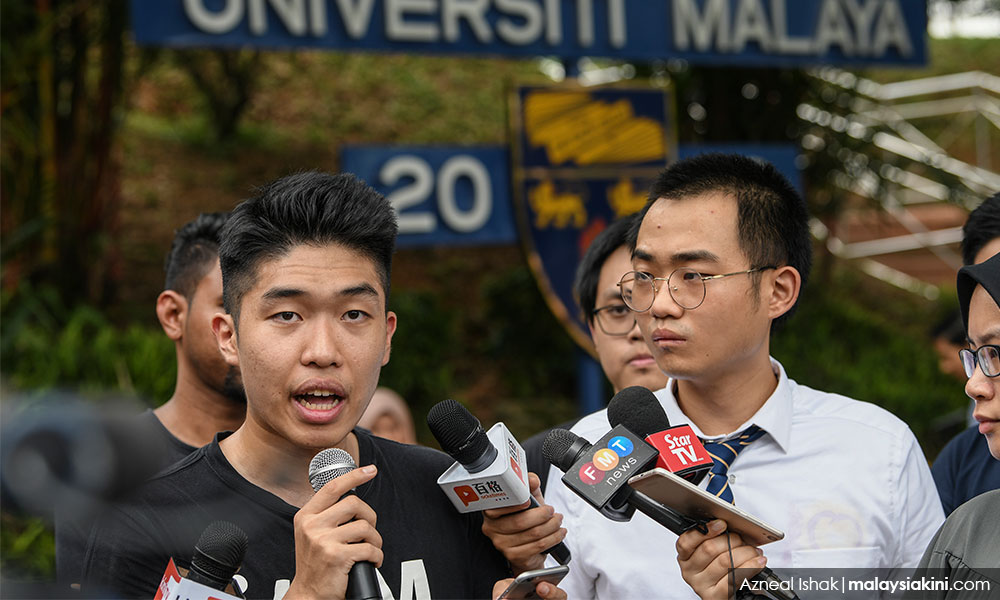
“The university practices a paternalistic management style. They see students from a top-down perspective and are never answerable to the students.
“They do not want us to raise questions as this is not the attitude that a ‘good student’ should have,” explained Wong.
Eventually, in the second year under Wong's leadership, the society was suspended from carrying out its activities by the university authorities.
According to Wong, the society spent more than a month attempting a reconcile with authorities and even begged for leniency for the suspension to be lifted.
However, the society’s efforts were in vain and Abdul Rahim refused to meet them as well.
“One time, we were forced to wait for the VC at the parking lot for a few hours. He still refused to come down from the chancellery building. We had no choice. We were desperate.
“At the end, we decided to expose the suspension through a press conference and gained solidarity from DAP and Gerakan. Only from that moment, the university slightly softened its stance after those politicians voiced out the matter.
“So you can see that the university authorities won’t listen to you even though you go through all the ‘proper channels’ as they claim. They only obey politicians.
“Does this not prove that the university only listens to power? Meanwhile, the students, who are part of the university, are ignored,” Wong lamented.
Different way of struggle
When efforts did not transform into changes, Wong decided to alter his way of struggle by joining student activism through the University of Malaya Association of New Youth (Umany), which is seen as the “radical student group” in the varsity.
That was also the time when Pakatan Harapan took over the federal government.
To fight for campus reforms, Wong and several other student activists went to the Parliament to seek support from Education Minister Maszlee Malik. One of their demands was to provide freedom to students to organise the campus election.
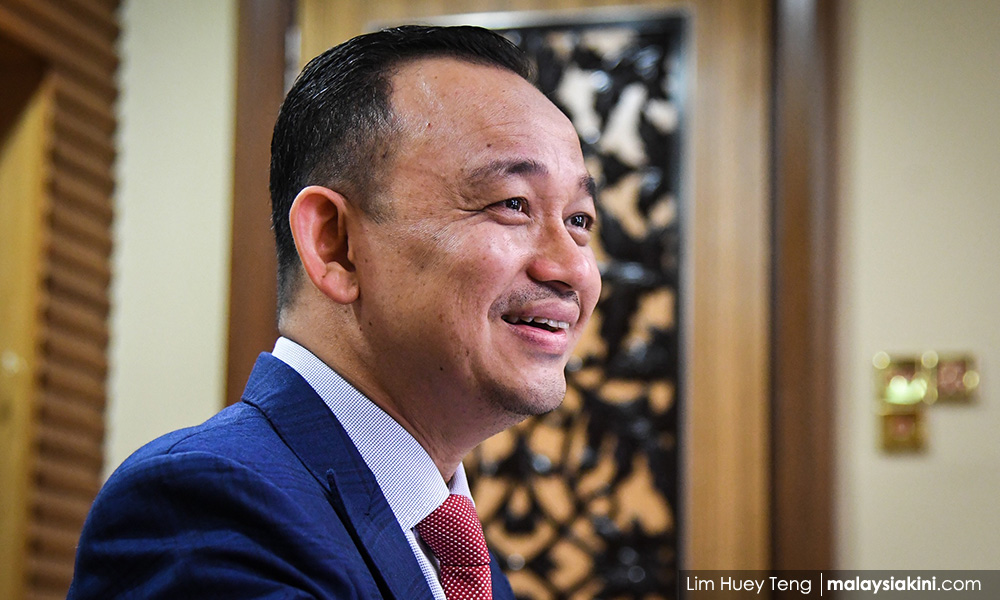
According to Wong, Maszlee (above) did not entertain their demands at that time.
However, the appointment of Maszlee as the International Islamic University Malaysia (IIUM) president happened right after that, which invited furious condemnations from student groups and the public.
Soon after the students protested, the Education Ministry announced that the student representative councils (MPP) at all public universities will be given the full freedom to carry out their respective campus elections beginning from 2018.
He believed that the announcement was done to calm the storm but rejoiced that the demands were achieved, albeit directly.
Following on from that, the UM pro-student (pro-mahasiswa) alliance won the campus elections in March this year and formed the UM Student Union (Umsu).
The union launched a series of reforms, which included an effort to erase the toxic culture of orientation week this year and reviving the positive tradition of the students' convoy.
The biggest backlash
Despite Wong not being a member of Umsu, he was constantly involved with student activism and social movements with Umany members.
He admitted that his involvement always received various responses and criticisms from the public and his latest solo protest onstage has created the biggest backlash.
Referring to the most common criticism that the graduation ceremony was not a “proper” or “correct” place to do a protest, Wong said it was the last option he had when the university VC was indifferent to most of the student issues.
“Graduates protesting on stage during a convocation ceremony is actually a common practice in the world. Why would I want to protest outside of the hall? Or simply issue a statement?"
“Then he (Abdul Rahim) can turn a blind eye on me. But when the protest happened in front of him and everyone else, he felt the public pressure and he has to answer.
“I really hope my actions can inspire more students and academicians to voice out their views. A lot of people may criticise privately, but we also need to take action so that we may bring in changes,” he said.
Wong feels that due to the political appointment system of the Education Ministry, the VC is not answerable to the students and this affects the accountability of the university administration.
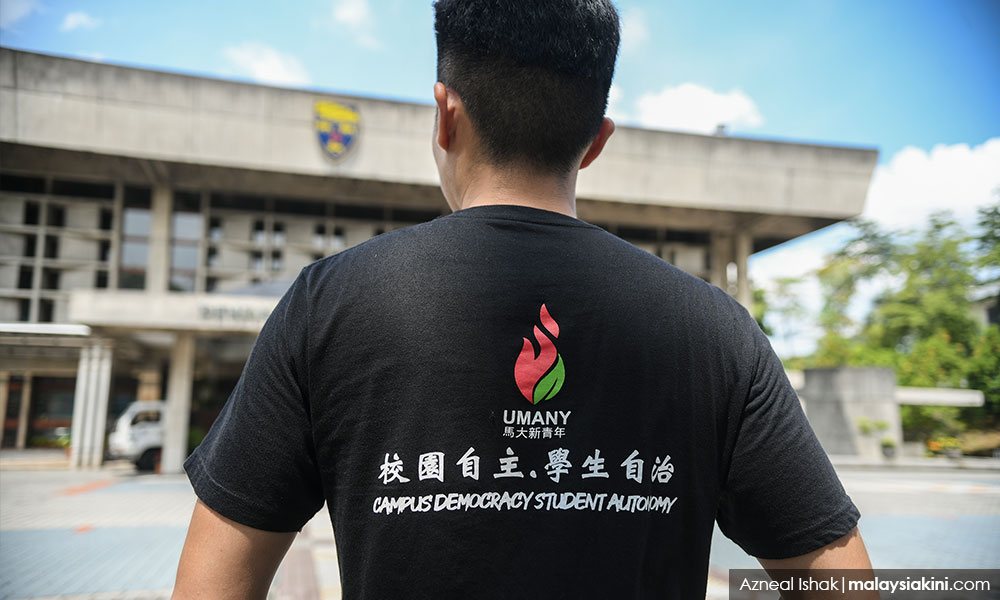
“The VC’s remark touched on the racial sensitivity, he was part of the congress organisation as well. But he was not answerable to the students, he only needed to serve the parties as he was politically appointed,” he said.
Not solely Chinese
As a Chinese majority student group, Umany is often bashed as a “Chinese-centric” race-based organisation and thus questioned on the legitimacy of its “radical moves”.
Wong clarified that Umany was not a Chinese association and welcomes everyone to join regardless of race and religion.
However, he admitted that there was only a very small number of Malay students in the group and Umany faced difficulties in attracting support from non-Chinese students.
“Perhaps some of my fellow students were worried they might lose the student votes, that’s why they did not plan to give solidarity.
“I understand, this will be a long process. The struggle needs the involvement of different races. We do need more activists to join the movement in the future. However, I won’t stop myself from standing up just because of my Chinese identity,” he reaffirmed.
The same applies to his solo protest.
“I did ask some friends to join me for the protest, but not many were willing to do so. But this did not stop me from continuing either.
“If I constrain myself because of the racial lens, how can we achieve a macro objective for our struggles? If I also see myself from an ethnic perspective, how can I persuade others to join the movement?” he asked.
Never compromise the struggle
Although there were very few Malay groups which stood in solidarity with Wong, he was reminded that there are vocal Malays outside of the campus.
For example, supporters from Gerakan Pembebasan Akademik (GPA), the majority of whom are Malays.
Wong acknowledged that sometimes, Umany holds a different stand from other student groups on how to address the campus issues. Nevertheless, he stressed that they will only consider bold action if their modest attempts do not work.
“But the moderates think it is alright to compromise. If problems cannot be solved, they would rather just let it be. That’s our major difference,” he said.
Contribute through policy research
After all the attention, Wong has now officially graduated from UM and started his working life as a civil engineer.
“I still have a great passion and concern about social and political issues. I feel like I want to join the academic and research world, to contribute more through policy research. I wish to join think-tanks and become a researcher,” he said.
“Do you plan to join any political party?” I asked.
He immediately shook his head.
“I do not have such thoughts at the moment. The political parties in Malaysia keep me disappointed.
“I do think that civil society needs more involvement from the public. Concern and involvement in politics do not mean you have to be a politician or join a party.
“If I have the opportunity, I really want to be a researcher and focus on policy research, so that I can contribute to a better world,” he smiled.
MALAYSIANS KINI is a series on Malaysians you should know.
PREVIOUSLY FEATURED
When a friendly ear makes all the difference
Capturing the secrets of the wildlife world


